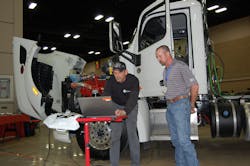SAN ANTONIO, TX. One of the major reasons Rush Truck Centers (RTC) – the commercial vehicle dealership arm of $3.1 billion Rush Enterprises – continues to boost the scope of its annual Technician Skills Rodeo is that the need for testing the company’s 2,000 plus corps of truck technicians continues to become more acute.
“It’s no longer enough just to fix a truck and get it running anymore,” Mike Besson, Rush’s VP of dealer operations and customer care, explained to Fleet Owner here at the eighth iteration of RTC’s yearly technician rodeo, where 100 of the company’s 2,000 technicians are competing for prizes, cash, hourly pay raises, and bragging rights.
“Today it’s all about troubleshooting; about finding the root cause of a particular problem so it doesn’t reappear,” he said. “Our ultimate mission is to provide maximum vehicle uptime to the customer, but if we don’t find the root cause of a truck problem, it might come right back to one of our shops even though we got it up and running.”
The complexity of today’s trucks – especially in terms of emission control systems and how components built by different suppliers interact with one another – is another key reason why the ability to troubleshoot truck problems correctly is perhaps the top skill required by technicians today, noted Steve Bertrand, Midwest district service manager for Peterbilt Motors Co. and one of the judges at the 2013 RTC rodeo.
“Trucks today are a giant ‘neural network,’ a rolling ‘cloud’ if you will of interconnected systems and information,” he explained. “That’s why I don’t like to see the ‘part changing’ solution for truck repairs. You may be wasting time replacing a perfectly good part that won’t be covered by the supplier warranty because that’s not where the problem is.”
Bertrand also believes one of the important characteristics of RTC’s annual rodeo event is that it forces technicians to logistically think through problems, not engage in what he termed the “substitution method” to find a “short cut” solution.
“This event tests their ability to think their way through an issue, not just throw parts at it,” he said. “Truck problems are often very interwoven today, so a technician needs to be well-rounded in several disciplines – from turning wrenches to navigating software and databases – while being able to ‘read between the lines’ to analyze what may really be going on with a fault code.”
The need for such “logical analysis” also stems from the reality that North American commercial vehicles are not completely vertically integrated entities like their European brethren, said Bertrand.
“Bendix provides the brakes, TRW the steering system, Allison or Eaton the transmission, Cummins an engine in many cases … the list goes on,” he says. “So a technician also needs to know how to effectively tap into the ‘supply chain’ of technical support offered by each component maker as well.”
Jason Swann – a 14-year veteran technician out of RTC’s Dallas location who’s been named the Rodeo’s heavy-duty champion three out of the last seven years – also pointed out that experience and a willingness to keep learning are critical ingredients to being a successful technician today.
“Mistakes are really your biggest opportunity to learn; and those opportunities only come with experience,” he told Fleet Owner. “You also need a willingness to learn; but you must also recognize you only get out of it what you put into it.”
About the Author
Sean Kilcarr
Editor in Chief
Sean Kilcarr is a former longtime FleetOwner senior editor who wrote for the publication from 2000 to 2018. He served as editor-in-chief from 2017 to 2018.
